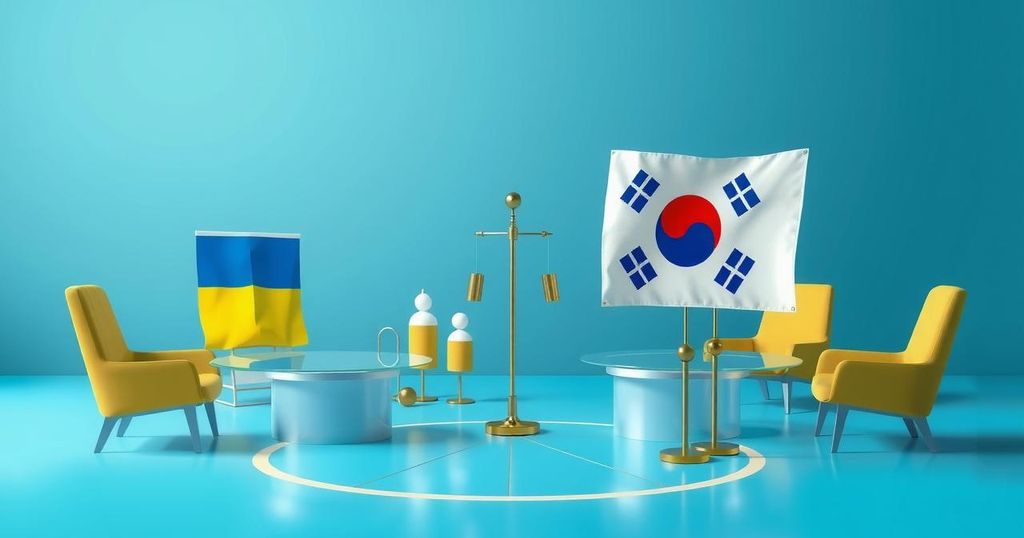Ukraine and South Korea Engage in Talks on Repatriating North Korean POWs

Diplomats from South Korea and Ukraine are negotiating the repatriation of two North Korean soldiers captured during conflict. South Korean Foreign Minister Cho Tae-yul emphasized that any transfer hinges on the soldiers’ desire to defect, highlighting the complexities of the situation. With substantial North Korean troop deployments aiding Russia and rising casualties, the ongoing discussions could significantly impact regional security and diplomatic relationships.
On March 17, 2025, diplomats from South Korea and Ukraine commenced negotiations regarding the repatriation of two North Korean soldiers captured amid ongoing hostilities with Russia. South Korean Foreign Minister Cho Tae-yul and Ukrainian Foreign Minister Andrii Sybiha discussed the potential transfer of these soldiers, whose status highlights intricate diplomatic sensitivities concerning resettlement and asylum requests.
South Korea’s position is defined by its constitutional view of North Koreans as citizens; thus, the decision to repatriate hinges on the captured soldiers’ intent to relocate. Cho emphasized, “Under South Korea’s Constitution, North Koreans are considered South Korean citizens, but the prisoners must express a desire to relocate,” illustrating the complexities involved in their asylum process.
The dialogues were prompted by North Korea’s substantial troop deployments to aid Russian military operations against Ukraine, occurring amid significant personnel deficits on Russia’s side. Reports suggest that about 12,000 North Korean troops were dispatched to Russia, coinciding with Ukrainian cross-border assaults that resulted in severe casualties for North Korean forces. Ukrainian intelligence estimates indicate over 4,000 North Korean soldiers have been killed or injured since the conflict’s escalation.
The two captured soldiers, taken alive on January 11, 2025, represent a notable instance of North Korean personnel being apprehended and surviving. They have since been provided medical care and are under the authority of Ukraine’s Security Service. Complicating matters, another soldier captured earlier succumbed to his injuries, raising questions regarding the fates of those apprehended.
Seoul’s long history with North Korean defectors, numbering approximately 34,000 since the late 1990s, underscores the significance of the current negotiations. Accepting the two soldiers could enhance South Korea’s humanitarian reputation while simultaneously risking its relationship with both North Korea and Russia.
The South Korean National Intelligence Agency has reported that the captured soldiers had not indicated any desire to defect as of January. This situation is particularly critical given the possibility of additional North Korean troop deployments to Russia. Reports also indicate that North Korean troops have engaged aggressively on the frontlines, adopting assault tactics described by Ukrainian officials.
Sybiha, on social media platform X, acknowledged the collaboration with South Korea while warning against the burgeoning alliance between Russia and North Korea, which could threaten security across various regions, including Europe and the Korean Peninsula.
Whether the captured soldiers will articulate a wish to relocate to South Korea remains unclear, potentially reflecting their hesitance to be leveraged by international negotiations. Criticism from figures such as North Korean defector Yeonmi Park has emerged, with accusations against Ukraine for potentially violating international law by linking prisoner repatriation with arms agreements.
Ukrainian President Zelensky highlighted the perilous conditions involving the capture of North Korean soldiers, revealing the challenges faced by Ukrainian forces due to North Korean and Russian military practices. His statement emphasized the high-risk environment surrounding the capture of personnel on the battlefield.
The decisions arising from these negotiations could significantly influence the captured soldiers’ futures and the broader geopolitical landscape. North Korea’s current silence on the proposal is indicative of ongoing complexities within a deeply fraught relationship marked by decades of tension and evolving strategic alliances.
In conclusion, the fate of the captured North Korean soldiers remains highly uncertain, mirroring broader geopolitical implications as the negotiations unfold. Their situation encapsulates intricate dynamics that could affect future engagements between the involved nations amidst ongoing conflict.
In summary, the negotiations between South Korea and Ukraine regarding the repatriation of captured North Korean soldiers encapsulate a complex interplay of humanitarian and geopolitical considerations. The captured soldiers’ willingness to request asylum is critical to the negotiations, reflecting the intricate nature of international relations amidst ongoing conflict. The outcome will not only determine the soldiers’ futures but may also influence regional security dynamics and diplomatic relations among the engaged nations.
Original Source: evrimagaci.org






